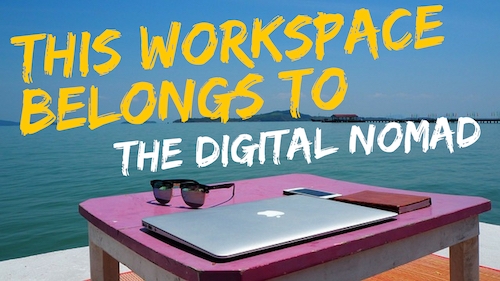These Internet-dependent freedom lovers travel around the world even while fulfilling their professional commitments, without physically reporting for work in an office.
Picture this: A café along the beach in a small hamlet in Indonesia. This is your workplace. No, you are not working in that café, but you are working out of that café!
You may be a writer, a techie, an accountant, or even an HR or marketing professional. If this seems to be the ideal situation for you, then you are likely to become a digital nomad soon.
Not everyone enjoys life in a busy metro with its ever growing traffic snarls and increasing pollution levels every day. If industrial revolution got people to migrate from smaller towns to the cities, the digital revolution will do just the reverse. People will move to smaller towns from cities and also continue with their high-profile corporate jobs.
Digital nomads are people who are location independent and use technology to perform their job. They are professionals who prefer to work remotely, primarily to enjoy their freedom. They can work out of cafés in France, libraries in Argentina, beach huts in Thailand, net cafes in Tokyo and office shares in Australia. They are mostly part of the knowledge economy – marketing, design IT, writing, and so on.
The number of digital nomads in the workforce is growing fast. As per estimates by Nomad List, the population of digital nomads will increase by more than one billion in the next two decades. Technologies, such as cloud computing and cloud-based customer relationship management (CRM) platforms, will make this happen.
Digital nomads are people who are location independent and use technology to perform their job. They are professionals who prefer to work remotely, primarily to enjoy their freedom.
Countries have also accepted these digital nomads. Estonia, a country in the Baltic region and the pioneer of e-residency, plans to launch a digital nomad visa that will allow people to work in Estonia for up to 365 days.
The visa will also permit them to travel to any place in the 26-nation Schengen Area for up to 90 days. Individuals are classed as digital nomads if they can work independent of location, that is, conduct a majority of their work online.
Digital nomads aren’t those who work from home or are remote workers who stay far away from the company headquarters. They are people who will work from any part of the world till the time there is Internet. They are people who love to travel and also keep working.
However, organisations are yet to accept these digital nomads and optimise their full potential. The old mindset makes it difficult to allay concerns over productivity, the lack of trust and the inability to track time. The truth is that many of these concerns are unfounded.
Countries have also accepted these digital nomads. Estonia, a country in the Baltic region and the pioneer of e-residency, plans to launch a digital nomad visa that will allow people to work in Estonia for up to 365 days. The visa will also permit them to travel to any place in the 26-nation Schengen Area for up to 90 days. Individuals are classed as digital nomads if they can work independent of location, that is, conduct a majority of their work online.
Organisations simply need to understand these digital nomads to overcome such inhibitions.
However, micromanagers will do well to stay away from digital nomads—they enjoy their freedom, and therefore, hate micro managers.
Digital nomads aren’t bothered about timing, but they are particular about delivery and deadlines. They may not be available for a meeting at the office but they prefer face-to-face interaction over the web.
Not necessarily loners, digital nomads can be just as equally collaborative as those who work out of an office. They are certainly better than those who despite being present in the office everyday prefer to stay away from the herd.
They may not keep knocking on their manager’s door for every little thing, but one may find them very articulate while summing up all their queries in one single mail a day!
It is said that digital nomads are often less stressed than in-office workers. That is why, they are able to take more responsibility for projects and care more about their success.
Also, digital nomads may not always stay so all their life. They will want to settle down at some point, when they get bored of wandering. That is when they will be available to work in the office. But remember, while they are potent talent, they will remain lovers of freedom.



